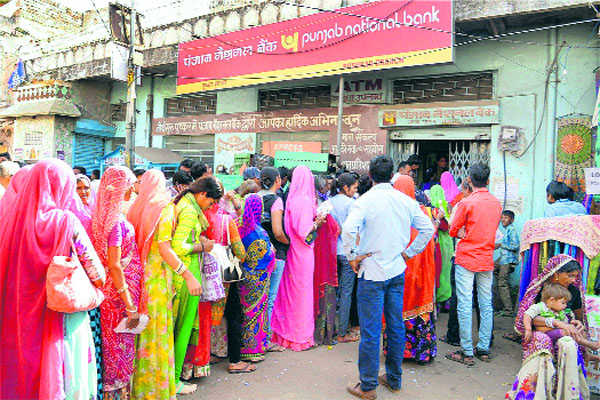
Strangely, even though we are at the very end of it, it does not feel like the year is almost over. Perhaps it is because until a few days ago, the weather was pleasant and almost warm and the dreaded fog not in sight. Then, within a quick week, everything changed. The fog is back double-force, the mercury is steadily dipping and the evenings are turning dark and long.
Perforce, one spends more time in front of the television than is healthy but what do you see? The sorry spectacle of our (dis)honourable parliamentarians shouting slogans and holding up the conduct of any business in both Houses of Parliament, unending speculation over the late Jayalalithaa’s political career and legacy and serpentine queues of people lining up to chase their daily quota of cash. Oddly enough, the people most outraged by the last problem are those who have never stood in a queue in their lives. They never visit a bank or buy their own groceries or vegetables. They call their workers ‘driver’ or ‘guard’, not bothering to accord them the basic courtesy of addressing them by their names. To them, ‘these people’ are just representatives of the common man or woman, faceless, nameless and unimportant. So when they are the ones who hold forth at the suffering of the common man, you marvel at their hypocrisy.
I find it amusing that we of a certain class (and entitlement) assume loftily that the system should understand that we were born to be superior and should pay homage to our elevated standing in society. The only brush with poverty that such people are likely to have is with the people who work for them and live in their quarters: they are what the late Romesh Thapar once dubbed ‘the baba log’. Added to this ancien regime aristocracy are now the parvenus who have made their millions by dubious means. They buy themselves social positions and party tickets to become representatives of the common man. Patrick French was the first to point out how most of our Parliament is composed of those who have a political lineage or mega money. So why are we shocked when they behave like spoilt schoolboys?
In the early sixties, the ration card was introduced to contain the expense on costly food imports. Sugar, rice, kerosene were some of the items that could only be procured through designated ration shops. Naturally, this led to a thriving black market for those who were able to pay the extra price or whose conscience did not balk at the illegality of it all. As children, we were asked to cut down our sugar intake and gur replaced the sugar in the tea that was brewed for the adults. We may have grumbled or made jokes about it, but everyone understood why rationing had been imposed. Our parents belonged to the war generation and had undergone similar self-regulation under the British Raj. Self-denial and doing it for one’s country was a sentiment that they understood well.
I am not saying that there is no merit in the arguments put forth by the learned economists and commentators who are bitterly opposed to demonetisation and the goof-ups in its implementation. No reasonable person can entirely agree with the government’s handling of the problem of black money. However, to hear Laloo Yadav, Mayawati, Mulayam Singh Yadav and Mamata Banerji -- all of whom have dubious links with people whose fortunes are dependent on the political patronage they receive from these worthies (many of whom have ongoing cases against them and have actually been convicted for holding disproportionate assets) -- thunder against the government’s decision weakens their moral position. Each institution, starting from the State to business houses and the media, has a few skeletons rattling in its cupboards. So who can cast the first stone?
At such a troubled time, one wishes for more honesty. Not just in one’s daily dealings but in freely speaking out against what is wrong, even if it means speaking out of party line. Privately, many people say something that is counter to what they are forced to say in public. This is true of every political party. However, there are those who cannot get themselves to admit that they admire a man or woman whose ideology is the opposite of theirs. The intolerance of the Left is as dangerous as that of the Right and will one day harm both their causes.
Finally, a celebration and tribute to one of the most amazing women it has been my privilege to know. Mrs BK Nehru (Aunty Fori to her legion admirers) turned 108 on December 5. To many who think Sonia Gandhi is a foreign bahu who adapted herself brilliantly to her new country, it may come as a surprise that Aunty Fori was married into the Nehru clan in 1938. Since then, she has worn the sari with pride, spoken Hindi and Urdu with elan and brought grace and elegance to whatever role she played. She lives by herself in Kasauli in a beautiful cottage she and her husband retired to when they gave up public life and although her eyesight is failing, her brain is as sharp as ever. To Aunty Fori, whom I vote her the woman of the year!



























